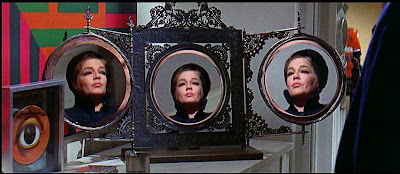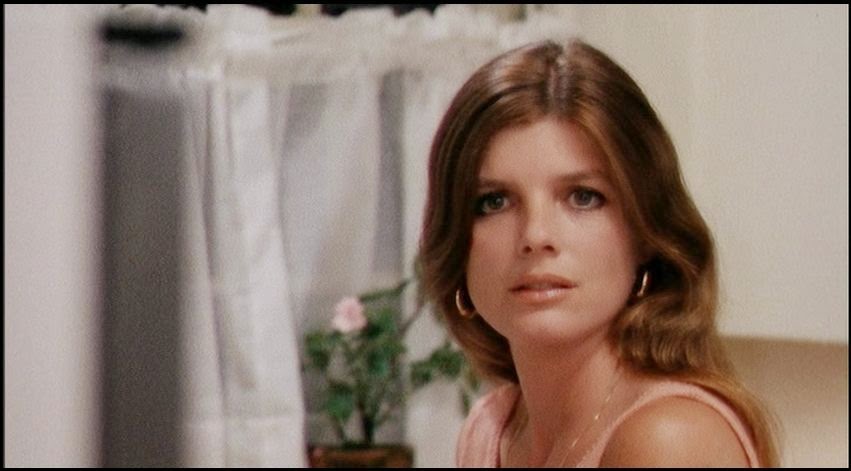Sometimes being a movie star just means having enough “brand
name recognition” to bring to each movie a kind of distinct, firmly established
name-association (a personality cachet, if you will) fully-formed and locked in
place from a previous film.
For example: to a large segment of the population Mia
Farrow was and always will be Rosemary Woodhouse of Rosemary’s Baby. The films See
No Evil (1971), The Haunting of Julia
(1977) and the 2006 remake of The Omen
all banked on the public associating Farrow with the macabre and horrific. None
perhaps so blatantly or swiftly as Joseph Losey’s difficult-to-market 1968 psychological
thriller Secret Ceremony, which was released only four months
after Rosemary’s Baby opened.
Although the film starred Hollywood heavyweights Elizabeth Taylor and Robert
Mitchum in their only screen pairing, ads emphasized what was then the film’s
one sure-fire property: Mia Farrow - “More
haunted than in Rosemary’s Baby!” the
posters screamed.
 |
| Satan Place Occult rituals are just one of many perverse diversions in Games |
After the success of Halloween (1978) critics began hailing director John Carpenter as a worthy successor to Alfred Hitchcock. Hoping to further encourage such comparisons, Carpenter cast perennially Hitchcock-associated actress Janet Leigh in a thoroughly arbitrary role in his 1980 film The Fog. Janet Leigh, who should be commended for not having turned the entirety of her latter years into one long series of stunt-casting parts cashing in on her iconic Psycho role, did allow her image to be exploited just one more time - in the 1998 Halloween sequel, Halloween H20: 20 Years Later (check out IMDB’s Trivia section for details) although it must be said these nothing roles at least afforded her the opportunity to appear onscreen with real-life daughter Jamie Lee Curtis.
 |
| Desensitization A well-appointed game room features violent Roy Lichtenstein pop-art and a pinball machine that awards points for driving fatalities |
In 1968, if American audiences knew much about French film star Simone Signoret at all (and they didn't) it was on the strength of three films: her Oscar- winning role in Room at the Top (1959); her Oscar-nominated turn in Stanley Kramer’s prestige flop, Ship of Fools; and… most popularly and most likely, the highly acclaimed and influential thriller Diabolique (1955). Internet sources maintain that the starring role of Lisa Schindler, the mysterious visitor in Games, was originally written for Marlene Dietrich, and when producers balked, the role was offered to Jeanne Moreau, who also declined. All of which may well be true. But after looking at this clever thriller full of twists and mysterious turns, the overwhelming evidence leans towards my belief that Games was conceived and written expressly to capitalize on and exploit the American public’s familiarity with Signoret’s starring role in Clouzot’s bloodcurdling French chiller.
 |
| Simone Signoret as Lisa Schindler |
 |
| Katharine Ross as Jennifer Montgomery |
 |
| James Caan as Paul Montgomery |
.JPG) |
| Brando-ish 70's TV stalwart, Don Stroud (who five years later would appear as a nude centerfold in Playgirl magazine) plays Norman, the oversexed box boy. Another player in Games |
WHAT I LOVE ABOUT THIS FILM
Compensating perhaps for all those years of hyperactivity in my youth, I’ve discovered of late that I’m remarkably adroit at being sedentary. It's a revelation to me that in my dotage I find I no longer go in search of thrills, but prefer instead for my
thrills come to me. Ill-disposed as I am to amusement park rides, fast cars, or any activity calling for the deployment of adrenaline, I have become a huge fan of armchair adventure. I love mysteries, suspense thrillers, horror films (horror as in dread, not gore) and movie plotting that stays one step ahead of me. Even when a film has plot twists which can be figured out if one really puts their mind to it (as some claim to be
the case with Games), I so enjoy the
big “reveal” in these kinds of movies that I've learned over the years how not
to spoil my own fun. I employ a subtle form of self-hypnosis, allow the plot to
unfold before me and just let myself surrender to the director’s pace, trying not to put the pieces of the puzzle together unless the film leads me there first.
 |
| Identity and Illusion |
PERFORMANCES
Regrettably, for all the fun to be had in watching Games
(like the 1972 film adaptation of Anthony Schaeffer’s Sleuth, its
pleasures don’t diminish even after its surprises are revealed) I can’t say it’s
a film one is likely to remember for the performances. In just a few short years the producers of Games probably wouldn't have been able to afford either Katharine Ross or James Caan, but
at this point in their young careers the future superstars are shown visibly trying to find their footing in this stylish thriller. Though falling short of making me really feel for the plight of the caracters, I've no real complaint with the beautiful Katharine Ross who is always an appealingly natural presence and is, I think, actually better here than she is in The Graduate. She definitely comes off much better than Caan, who seems a tad stiff trying to play an urbane sophisticate who's still a little rough around the edges.
 |
| Simone Signoret claimed responsibility for bringing Katharine Ross to the attention of director Mike Nichols when he was casting The Graduate |
 |
| Something Wicked This Way Comes? Oddly unsettling artwork (Roy Lichtenstein?) dominates this shot and adds a sense of apprehension and danger to the scene |
THE STUFF OF FANTASY
Paul and Jennifer Montgomery are the idle wealthy. A little too much money and too much time on their hands extends to their eccentric collection of modern art. The pieces, whimsical and absurd works displayed throughout their spacious New York townhouse, create the effect that we are watching events play out on an oversized game board or inside a pinball machine.
THE STUFF OF DREAMS
The first time I saw Games was when it aired on NBC-TV back in the early '70s. I recall I'd found it to be very much the unsettling suspenser, keeping me on the edge of my seat as the swift turns of plot not only taking me by surprise but scaring the hell out of me. No longer a kid and revisiting it on DVD some 30 years later, I was prepared for it to be a nice, tame nostalgia trip with maybe the distraction of camp taking the place of the suspense.
Not the case. The years may have shaved a little of the originality off its plot, but the effectiveness of the film itself - the sustaining of mood, the building of suspense, the unforeseen twists - it all worked for me just as persuasively as when I first saw it in my youth. In fact, much of the film played better in some instances; particularly in my taking note of all the foreshadowing in events, and the allusions made to the articficiality and contrivance of pop-culture, pop-art,and pop-amorality.
Games is no classic, and to some it will look a great deal like a well-made '70s TV movie. But as suspense thrillers go (and when was the last time a good one of those appeared on the horizon?), I have to say, flaws and all, Games comes out looking like a winner.




































.jpg)




.JPG)



.JPG)




.JPG)



